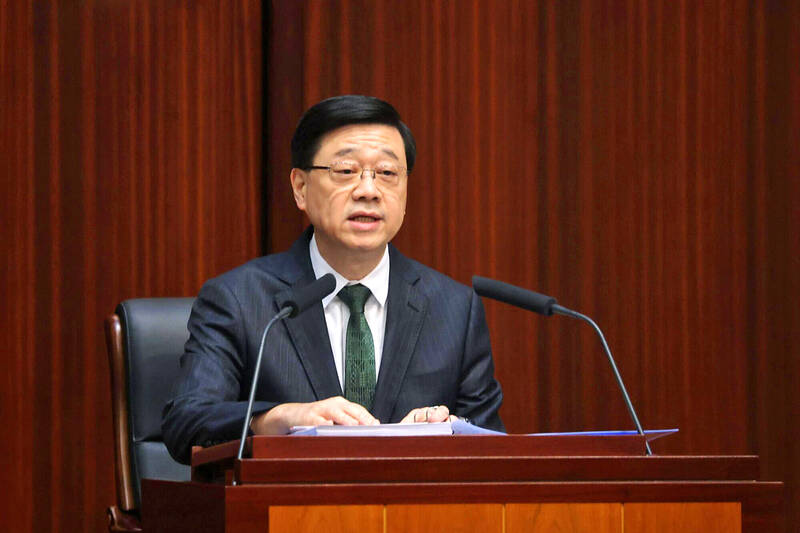Hong Kong is to loosen mortgage rules and cut an alcohol tax in a series of measures seeking to support the flagging real-estate sector and boost spending, as China’s slowdown weighs on the territory’s economy.
Hong Kong Chief Executive John Lee (李家超) yesterday said he would raise the amount of loans homebuyers are allowed to borrow for some properties and broaden a residency-by-investment program.
The territory’s leader also announced a drastic cut to a tax on liquor, looking to boost a services sector struggling with fewer tourists and weak sentiment.

Photo: Bloomberg
“We must maintain our development momentum and self-renewal, and that we must embrace changes while staying principled, innovative and flexible in meeting challenges and opportunities,” Lee said in his annual policy address.
Lee set his sights on boosting the economy after cementing Beijing’s authority over the territory with a new national security law earlier this year, a move Western governments criticized for muzzling open discussion in the Asian finance hub.
The territory’s economy grew in the first six months within the official forecast range of 2.5 to 3.5 percent, thanks to strong exports that offset sluggish consumption, although China’s slowdown and geopolitical uncertainties have cast a cloud on Hong Kong’s growth outlook.
A focus of Lee’s speech was the ailing property sector, with home prices hovering near a 2016 low.
He said the maximum loan-to-value ratio for all homes would be set at 70 percent, allowing some homebuyers to fork out lower down payments.
The ratio is currently capped below that threshold for homes above HK$30 million (US$3.86 million) and 60 percent for those valued above HK$35 million.
A broadened investment migration program would include homes valued at HK$50 million or more as part of the required HK$30 million investment. Previously excluded, such property purchases would fulfill one-third of that requirement.
Thomas Chak (翟聰), head of capital markets and investment services at Colliers International, said the new home investment policy would help attract wealthy individuals to the territory and boost transaction volume in luxury properties, but would have a limited impact on the general residential market.
Hong Kong would also lower the amount of tax it levies on spirits to help the services and food industry, Lee said.
The duty for liquor with an import price of more than HK$200 would be lowered to 10 percent from 100 percent, with the lower rate applicable to the excess amount.
These sectors have struggled as sales and tourist arrivals remain below levels before the COVID-19 pandemic, with a wave of bankruptcies pointing to eroding business finances. That period saw the territory’s image take a hit from draconian quarantine measures and a crackdown on pro-democracy political opposition, including former media mogul Jimmy Lai (黎智英), whose national security trial resumes next month.

When an apartment comes up for rent in Germany’s big cities, hundreds of prospective tenants often queue down the street to view it, but the acute shortage of affordable housing is getting scant attention ahead of today’s snap general election. “Housing is one of the main problems for people, but nobody talks about it, nobody takes it seriously,” said Andreas Ibel, president of Build Europe, an association representing housing developers. Migration and the sluggish economy top the list of voters’ concerns, but analysts say housing policy fails to break through as returns on investment take time to register, making the

NOT TO WORRY: Some people are concerned funds might continue moving out of the country, but the central bank said financial account outflows are not unusual in Taiwan Taiwan’s outbound investments hit a new high last year due to investments made by contract chipmaker Taiwan Semiconductor Manufacturing Co (TSMC, 台積電) and other major manufacturers to boost global expansion, the central bank said on Thursday. The net increase in outbound investments last year reached a record US$21.05 billion, while the net increase in outbound investments by Taiwanese residents reached a record US$31.98 billion, central bank data showed. Chen Fei-wen (陳斐紋), deputy director of the central bank’s Department of Economic Research, said the increase was largely due to TSMC’s efforts to expand production in the US and Japan. Investments by Vanguard International

WARNING SHOT: The US president has threatened to impose 25 percent tariffs on all imported vehicles, and similar or higher duties on pharmaceuticals and semiconductors US President Donald Trump on Wednesday suggested that a trade deal with China was “possible” — a key target in the US leader’s tariffs policy. The US in 2020 had already agreed to “a great trade deal with China” and a new deal was “possible,” Trump said. Trump said he expected Chinese President Xi Jinping (習近平) to visit the US, without giving a timeline for his trip. Trump also said that he was talking to China about TikTok, as the US seeks to broker a sale of the popular app owned by Chinese firm ByteDance Ltd (字節跳動). Trump last week said that he had

STRUGGLING TO SURVIVE: The group is proposing a consortium of investors, with Tesla as the largest backer, and possibly a minority investment by Hon Hai Precision Nissan Motor Co shares jumped after the Financial Times reported that a high-level Japanese group has drawn up plans to seek investment from Elon Musk’s Tesla Inc to aid the struggling automaker. The group believes the electric vehicle (EV) maker is interested in acquiring Nissan’s plants in the US, the newspaper reported, citing people it did not identify. The proposal envisions a consortium of investors, with Tesla as the largest backer, but also includes the possibility of a minority investment by Hon Hai Precision Industry Co (鴻海精密) to prevent a full takeover by the Apple supplier, the report said. The group is